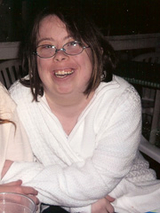Trisomy 21 (Down Syndrome): Cristin's Story
Trisomy 21 (Down Syndrome): Cristin's Story
Transitioning to the adult healthcare world can be tough for anyone. For young adults with trisomy 21 and their parents, it’s a particular challenge.

Terri Durkin encountered obstacles when her daughter, Cristin, entered her 20s.
“In the adult world you don’t fit in quite as well as in the pediatric world,” Terri says. “Our kids can’t express themselves as well, and it’s tough getting adult doctors to understand. It’s not that the adult medical community doesn’t want to help, but their resources are limited by time and insurance requirements.”
A lengthy, unsuccessful search for an adult primary care provider and specialists was lent a sense of urgency when Cristin began experiencing chronic headaches. Finally Terri turned to an old friend: The Children’s Hospital of Philadelphia (CHOP).
Cristin’s diagnosis had been confirmed by a CHOP geneticist when she was a week old. As she grew, she saw endocrinologists, otolaryngologists (ear, nose and throat doctors), and other specialists for a variety of issues.
Though Cristin was never a patient of the Trisomy 21 Program, a team at CHOP with expertise in trisomy 21, now Terri turned there for help. She called Kim Schadt, MSN, CRNP, assistant program director.
“I was online looking, and my assumption was that Cristin wouldn’t be able to be seen at CHOP because she is an adult,” Terri recalls. “I wanted to ask for a recommendation for an adult doctor. But Kim said ‘Bring her here.’”
Caring for adults with trisomy 21
In fact, adult care is an important part of the Trisomy 21 Program. Of the program’s 1,000 patients, 200 are older than age 18, with many in their 30s and 40s. The team includes doctors, nurse practitioners and physical therapists trained in both pediatric and adult care.
They provide annual exams for adult patients, keeping each up-to-date on neurological screenings and other recommended guidelines for adult trisomy 21 care. The care they provide is in addition to — not in place of — primary adult care. The team communicates with the primary provider and the family to find solutions to challenges and concerns.
At 24, Cristin became a patient of the Trisomy 21 Program, visiting for an appointment with David Lynch, MD, PhD, an adult neurologist who is the program’s director. Over several months, Dr. Lynch and team, along with Cristin and her parents, attempted to isolate the cause of her headaches, trying different strategies until the pain began to taper off.
“They never gave up on her,” Terri recalls. “They asked, ‘Are we really understanding where her pain is or what’s bothering her?’ They took the time to decipher what she was saying. They were so helpful and patient.”
In the three years since, the team has helped the family through another difficult experience: recurrent acid reflux.
“We kept getting bounced between ENTs and GIs on the adult side,” Terri says. “The Trisomy 21 Program would always provide a referral or suggestion. It took more than a year but they helped us find a doctor who could give her some relief.”
Continuing support
Cristin continues to see Dr. Lynch at least once a year for her annual checkup, and Terri calls or emails the team when she needs help and suggestions.
“I don’t know what I would have done without the support that they gave us these last few years,” Terri says. “Our experience has been so wonderful. I feel like I can always rely on the Trisomy 21 Program, no matter what.”
Originally posted: April 2012